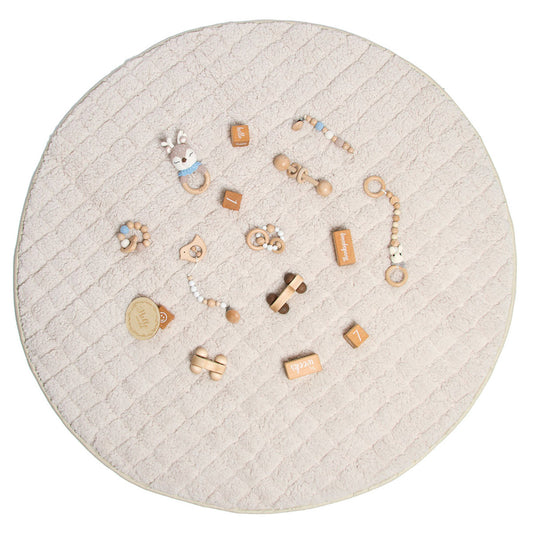Article Information:
Updated:
Excerpt:

You may also like:
What Are Age-Appropriate Chores for My Child?
Check out our list of age-appropriate chores for kids! Help your child feel accomplished and responsible by giving them age-appropriate chores to complete around the house.
Preparing for Toddler Potty Training: Setting the Stage
If you're thinking about potty training your toddler, you might be wondering how to get started. Here are some tips for preparing for toddler potty training, including setting the stage for success.
Selecting the Right Potty for Your Toddler: Potty Chair vs. Potty Seat
If you're potty training your toddler, you may be wondering whether to get a potty chair or potty seat. Here's a look at the pros and cons of each option to help you make the best decision for your child.
Harness Your Toddler's Interest in Touching Things to Foster Language Skills
You can use your toddler's interest in touching things to help them develop language skills. By encouraging your child to touch and explore different objects, you can help them learn new words and concepts. Additionally, you can use touching games and activities to help your toddler develop fine motor skills.
How to Promote Independence in Your Toddler and Reduce Clinginess
As your toddler becomes more independent, you may notice a change in their behavior. They may become clingy and want to be with you all the time. Here are some tips to promote independence in your toddler and reduce clinginess.
How to Foster Impulse Control in Your Toddler
If you have a toddler, you know that they can be impulsive. But there are ways to help foster impulse control in your toddler. Check out our blog post for tips.
Unlocking Language Learning: The Milestone of Combining Words in Toddlers
A blog about how to help your toddler unlock the milestone of combining words in their language learning.
Mastering Toddler Climbing and Balance: Expert Strategies for Parents
If you're looking for expert strategies on how to help your toddler master climbing and balance, this is the blog for you! We'll share tips and advice on everything from safety to encouraging your little one to keep practicing.
Enhancing Your Toddler's Friendship Skills: Three Effective Strategies
Are you looking for ways to help your toddler make friends? If so, you're in the right place. In this blog post, we'll share three effective strategies for enhancing your toddler's friendship skills. By following these tips, you can help your child develop the social skills needed to make and keep friends.
Practice Empathy with Your Toddler Using This Technique
Use this simple technique to help your toddler understand and share in your feelings.
Why "You Worked So Hard" Is Better Than "You're So Smart"
"You Worked So Hard' vs 'You're So Smart': The Power of Validation"
Education and upbringing have long praised intelligence for success. But recent research suggests that acknowledging effort and hard work may be even better. This article explores why "You worked so hard" is better than "You're so smart".
Effort and perseverance are essential for success. By recognizing their hard work, we validate their dedication, determination, and resilience. This helps foster a growth mindset, seeing challenges as opportunities to grow.
Praising effort over intelligence combats the harmful effects of a fixed mindset. Praising someone's intelligence can lead to fear of failure or avoiding challenges. Recognizing effort teaches progress comes from practice, leading to increased motivation and resilience.
Studies show emphasizing hard work leads to improved performance compared to intelligence-based praise. In one experiment, students praised for hard work showed higher motivation and better results.
Shifting focus from innate abilities to valuing effort can have a huge impact on an individual's mindset and performance. Education should emphasize the importance of hard work and perseverance for success.
"You Worked So Hard" and "You're So Smart"
The phrases "You Worked So Hard" and "You're So Smart" are often seen as compliments. But, they have a different meaning. This can have an effect on someone's attitude and motivation.
When we say "You worked so hard," we recognize their dedication, determination, and the effort put in to reach their goals. This shows that success comes from trying hard, not from natural skills.
But, when we say "You're so smart," it suggests success from natural intelligence or talent. This may make them feel good momentarily, but it can also create a fixed mindset. They may think success should come easy, and get discouraged with difficult challenges.
So, it's better to focus on hard work rather than intelligence. This growth mindset helps people stay persistent and see failure as a learning opportunity.
Parents, educators, and mentors should keep this in mind when giving praise. Emphasizing hard work over natural skills encourages individuals to continue developing their abilities and embrace difficulties.
The benefits of praising effort over intelligence
To understand the discussion on the benefits of praising effort over intelligence, delve into the effects of praise on mindset and motivation. Research uncovers intriguing insights.
Research on the effects of praise on mindset and motivation
Studies have revealed that when kids are praised for their intelligence instead of their effort, they tend to develop a fixed mindset. This means they believe their abilities are limited. But if they receive praise for their efforts and strategies, they will likely foster a growth mindset and accept challenges.
Counterarguments and refutations
When praising someone's achievements, it's better to say "You worked so hard" instead of "You're so smart." Let's take a look at counterarguments and refutations to understand why. Here's a table to highlight the differences:
| 'You worked so hard' | 'You're so smart' | |
|---|---|---|
| Effect on Effort | Encourages continuous effort | May discourage effort |
| Growth Mindset | Develops a growth mindset | Reinforces fixed mindset |
| Emphasizes Skill | Focuses on learning and growth | Promotes natural ability |
Using phrases like "You're so smart" can discourage effort. Praising hard work motivates and acknowledges dedication. Plus, emphasizing effort encourages a growth mindset. This mindset means abilities can be improved through dedication and perseverance. Take Thomas Edison as an example. He had many failures while inventing the light bulb, but he never gave up. He saw each failure as an opportunity to grow. His hard work led to one of the most transformative inventions in history. The conclusion: Working hard doesn't make you the smartest, but it makes you the most deserving of success.
Conclusion
It's often said that working hard is better than being smart. Acknowledging effort rather than intelligence has a massive effect on motivation, mindset, and overall success. By focusing on hard work, we can shift the spotlight from natural abilities to learning. This promotes a growth mindset, where people think their intelligence and gifts can be developed with dedication and effort.
Praising the effort recognizes the journey, not just the outcome. It shows the importance of determination, resilience, and consistency in achieving success. When people know their hard work brings progress, they stay motivated even if they face difficulties.
To make the approach effective, it's important to give specific feedback that highlights effort. Instead of saying "You're so smart," it's better to say "I appreciate the time and effort you put into this project." This way, people feel recognized for their hard work, and are encouraged to keep going.
Another suggestion is to offer opportunities for growth and improvement, rather than relying on intelligence as the only measure of success. By giving constructive feedback and guidance to improve skills, people are more likely to have a growth mindset and strive for continuous improvement.
Frequently Asked Questions
Q: Why is "You worked so hard" better than "You're so smart"?
A: "You worked so hard" acknowledges the effort and perseverance put into achieving a goal, promoting a growth mindset, resilience, and dedication. It emphasizes the importance of hard work over innate abilities.
Q: Does saying "You're so smart" have negative effects?
A: Yes, constantly praising someone's intelligence can lead to a fixed mindset, where they believe their abilities are predetermined and cannot be improved. It can also create pressure to always perform at a high level, leading to fear of failure.
Q: How does saying "You worked so hard" encourage learning?
A: By emphasizing the effort invested, it encourages a person to continue putting in the work to improve and learn from their mistakes. It fosters resilience, problem-solving skills, and a growth mindset.
Q: Does praising effort mean ignoring natural talent?
A: No, praising effort does not disregard natural talent or abilities. Instead, it recognizes that even individuals with natural talent need to put in effort and work hard to fully develop and reach their potential.
Q: Can saying "You worked so hard" boost self-esteem?
A: Absolutely! Recognizing and appreciating the effort someone puts into their work helps build their self-confidence and self-worth. It highlights their dedication and the value of their hard work.
Q: How does praising effort benefit motivation?
A: Praising effort cultivates intrinsic motivation, as it encourages individuals to find satisfaction in the process of learning and improving rather than relying solely on external validation or results. It promotes a lifelong love for learning.
Why "You Worked So Hard" Is Better Than "You're So Smart"
Updated:

"You Worked So Hard' vs 'You're So Smart': The Power of Validation"
Education and upbringing have long praised intelligence for success. But recent research suggests that acknowledging effort and hard work may be even better. This article explores why "You worked so hard" is better than "You're so smart".
Effort and perseverance are essential for success. By recognizing their hard work, we validate their dedication, determination, and resilience. This helps foster a growth mindset, seeing challenges as opportunities to grow.
Praising effort over intelligence combats the harmful effects of a fixed mindset. Praising someone's intelligence can lead to fear of failure or avoiding challenges. Recognizing effort teaches progress comes from practice, leading to increased motivation and resilience.
Studies show emphasizing hard work leads to improved performance compared to intelligence-based praise. In one experiment, students praised for hard work showed higher motivation and better results.
Shifting focus from innate abilities to valuing effort can have a huge impact on an individual's mindset and performance. Education should emphasize the importance of hard work and perseverance for success.
"You Worked So Hard" and "You're So Smart"
The phrases "You Worked So Hard" and "You're So Smart" are often seen as compliments. But, they have a different meaning. This can have an effect on someone's attitude and motivation.
When we say "You worked so hard," we recognize their dedication, determination, and the effort put in to reach their goals. This shows that success comes from trying hard, not from natural skills.
But, when we say "You're so smart," it suggests success from natural intelligence or talent. This may make them feel good momentarily, but it can also create a fixed mindset. They may think success should come easy, and get discouraged with difficult challenges.
So, it's better to focus on hard work rather than intelligence. This growth mindset helps people stay persistent and see failure as a learning opportunity.
Parents, educators, and mentors should keep this in mind when giving praise. Emphasizing hard work over natural skills encourages individuals to continue developing their abilities and embrace difficulties.
The benefits of praising effort over intelligence
To understand the discussion on the benefits of praising effort over intelligence, delve into the effects of praise on mindset and motivation. Research uncovers intriguing insights.
Research on the effects of praise on mindset and motivation
Studies have revealed that when kids are praised for their intelligence instead of their effort, they tend to develop a fixed mindset. This means they believe their abilities are limited. But if they receive praise for their efforts and strategies, they will likely foster a growth mindset and accept challenges.
Counterarguments and refutations
When praising someone's achievements, it's better to say "You worked so hard" instead of "You're so smart." Let's take a look at counterarguments and refutations to understand why. Here's a table to highlight the differences:
| 'You worked so hard' | 'You're so smart' | |
|---|---|---|
| Effect on Effort | Encourages continuous effort | May discourage effort |
| Growth Mindset | Develops a growth mindset | Reinforces fixed mindset |
| Emphasizes Skill | Focuses on learning and growth | Promotes natural ability |
Using phrases like "You're so smart" can discourage effort. Praising hard work motivates and acknowledges dedication. Plus, emphasizing effort encourages a growth mindset. This mindset means abilities can be improved through dedication and perseverance. Take Thomas Edison as an example. He had many failures while inventing the light bulb, but he never gave up. He saw each failure as an opportunity to grow. His hard work led to one of the most transformative inventions in history. The conclusion: Working hard doesn't make you the smartest, but it makes you the most deserving of success.
Conclusion
It's often said that working hard is better than being smart. Acknowledging effort rather than intelligence has a massive effect on motivation, mindset, and overall success. By focusing on hard work, we can shift the spotlight from natural abilities to learning. This promotes a growth mindset, where people think their intelligence and gifts can be developed with dedication and effort.
Praising the effort recognizes the journey, not just the outcome. It shows the importance of determination, resilience, and consistency in achieving success. When people know their hard work brings progress, they stay motivated even if they face difficulties.
To make the approach effective, it's important to give specific feedback that highlights effort. Instead of saying "You're so smart," it's better to say "I appreciate the time and effort you put into this project." This way, people feel recognized for their hard work, and are encouraged to keep going.
Another suggestion is to offer opportunities for growth and improvement, rather than relying on intelligence as the only measure of success. By giving constructive feedback and guidance to improve skills, people are more likely to have a growth mindset and strive for continuous improvement.
Frequently Asked Questions
Q: Why is "You worked so hard" better than "You're so smart"?
A: "You worked so hard" acknowledges the effort and perseverance put into achieving a goal, promoting a growth mindset, resilience, and dedication. It emphasizes the importance of hard work over innate abilities.
Q: Does saying "You're so smart" have negative effects?
A: Yes, constantly praising someone's intelligence can lead to a fixed mindset, where they believe their abilities are predetermined and cannot be improved. It can also create pressure to always perform at a high level, leading to fear of failure.
Q: How does saying "You worked so hard" encourage learning?
A: By emphasizing the effort invested, it encourages a person to continue putting in the work to improve and learn from their mistakes. It fosters resilience, problem-solving skills, and a growth mindset.
Q: Does praising effort mean ignoring natural talent?
A: No, praising effort does not disregard natural talent or abilities. Instead, it recognizes that even individuals with natural talent need to put in effort and work hard to fully develop and reach their potential.
Q: Can saying "You worked so hard" boost self-esteem?
A: Absolutely! Recognizing and appreciating the effort someone puts into their work helps build their self-confidence and self-worth. It highlights their dedication and the value of their hard work.
Q: How does praising effort benefit motivation?
A: Praising effort cultivates intrinsic motivation, as it encourages individuals to find satisfaction in the process of learning and improving rather than relying solely on external validation or results. It promotes a lifelong love for learning.
You may also like:
What Are Age-Appropriate Chores for My Child?
Check out our list of age-appropriate chores for kids! Help your child feel accomplished and responsible by giving them age-appropriate chores to complete around the house.
Preparing for Toddler Potty Training: Setting the Stage
If you're thinking about potty training your toddler, you might be wondering how to get started. Here are some tips for preparing for toddler potty training, including setting the stage for success.
Selecting the Right Potty for Your Toddler: Potty Chair vs. Potty Seat
If you're potty training your toddler, you may be wondering whether to get a potty chair or potty seat. Here's a look at the pros and cons of each option to help you make the best decision for your child.
Harness Your Toddler's Interest in Touching Things to Foster Language Skills
You can use your toddler's interest in touching things to help them develop language skills. By encouraging your child to touch and explore different objects, you can help them learn new words and concepts. Additionally, you can use touching games and activities to help your toddler develop fine motor skills.
How to Promote Independence in Your Toddler and Reduce Clinginess
As your toddler becomes more independent, you may notice a change in their behavior. They may become clingy and want to be with you all the time. Here are some tips to promote independence in your toddler and reduce clinginess.
How to Foster Impulse Control in Your Toddler
If you have a toddler, you know that they can be impulsive. But there are ways to help foster impulse control in your toddler. Check out our blog post for tips.
Unlocking Language Learning: The Milestone of Combining Words in Toddlers
A blog about how to help your toddler unlock the milestone of combining words in their language learning.
Mastering Toddler Climbing and Balance: Expert Strategies for Parents
If you're looking for expert strategies on how to help your toddler master climbing and balance, this is the blog for you! We'll share tips and advice on everything from safety to encouraging your little one to keep practicing.
Enhancing Your Toddler's Friendship Skills: Three Effective Strategies
Are you looking for ways to help your toddler make friends? If so, you're in the right place. In this blog post, we'll share three effective strategies for enhancing your toddler's friendship skills. By following these tips, you can help your child develop the social skills needed to make and keep friends.
Practice Empathy with Your Toddler Using This Technique
Use this simple technique to help your toddler understand and share in your feelings.
-
-
Leaf Shaped Sherpa & Cotton Baby Playmat - Pearl
Rated 4.9 out of 5$63.20$79.00$63.20Sale -
French Linen Baby Playmat - Natural
Rated 4.8 out of 5$71.20$89.00$71.20Sale -
Sherpa & Cotton Baby Playmat - Pearl Sherpa
Rated 4.8 out of 5$71.20$89.00$71.20Sale




